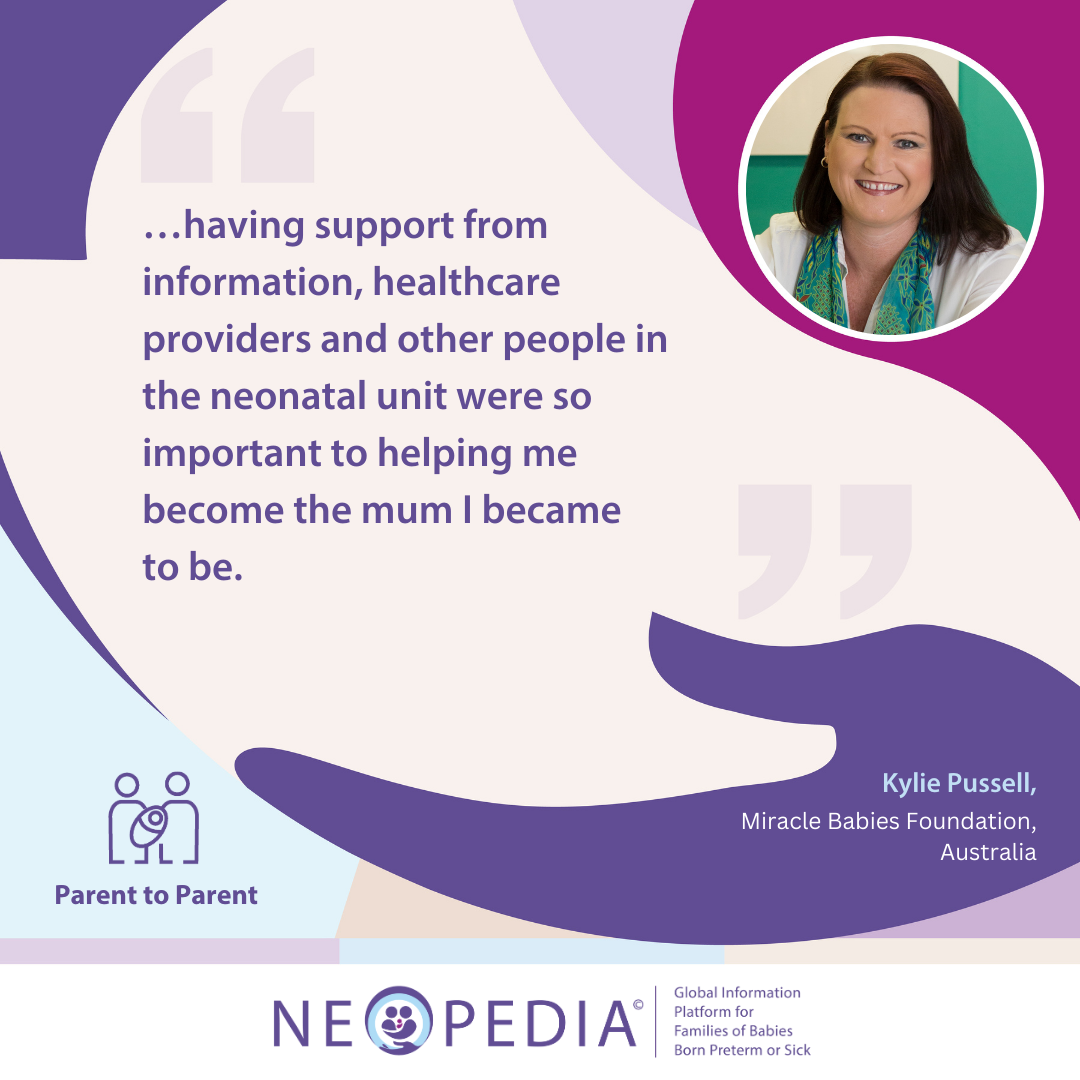
The NICU care team most often includes various types of specialists, each dedicated to caring for your baby in their specific areas of expertise. However, the names and roles of NICU specialists, along with their availability and the services neonatal units offer, differ by region. Parents, too, are essential members of the care team.
Discharge coordinators (also called outreach teams)
Experienced nurses or midwives help families get ready to take their baby home and guide them through what to expect when caring for preterm or sick babies at home.
Doctors
Neonatologists⍰, pediatricians⍰, and other specialists that take care of preterm and sick babies in the NICU.
Family support representatives
Psychologists, social workers⍰, and chaplains⍰ offer emotional and practical support to families. Also, many regions have dedicated parent organizations available to provide you with support, check out the list of available parent organization on this site.
Lactation specialists and dietitians
They help with breastfeeding and ensure babies get the right nutrition.
Nurses and midwives
Specially trained nurses and midwives monitor and handle daily care of the babies and support parents how to care for them.
Parents
Parents become the experts of their baby, knowing all their signs and how to comfort them.
Pharmacists
Pharmacists ensure medications are safely prepared, dosed, and given to meet the unique needs of preterm or sick babies.
Respiratory therapists
Respiratory therapists provide specialized care to support and monitor babies’ breathing, including managing oxygen and ventilators⍰.
Therapists
Different therapists, for example physiotherapists⍰, speech and language therapists⍰, as well as occupational therapists⍰, help babies develop properly and plan for any needed care after leaving the hospital.
Transport team members
Transport team members ensure the safe transfer of babies to and from the NICU while delivering critical care during the journey.
In some NICUs, experienced nurses or midwives help families prepare for going home. They inform the care team and parents about what needs to be done, such as teaching parents how to bathe their baby. They provide counselling to boost parents' confidence and help arrange necessary equipment for home care.
Most doctors in a NICU are neonatologists. They are pediatricians and have specialized training in caring for sick and preterm babies. You might also see fellows, residents, and medical students at different stages of their training. For specific questions about your baby's care, speak to the NICU care team member with the most expertise in that area. For example, treatment updates may be best discussed with a neonatologist, while feeding plans might come from a nurse or lactation consultant⍰.
The NICU care team may consult other doctors, like pediatric surgeons⍰, for specific medical issues. Trainee surgeons might also be part of the team. Radiographers, who are not doctors but specialized technicians, take X-rays⍰ or use ultrasound⍰ to examine internal body structures, while radiologists interpret and repost the X-ray findings. Ophthalmologists specialize in eye conditions.
Having a baby in the NICU can be overwhelming for parents but ideally there are different professionals that offer you support. Psychologists provide mental health care, helping parents cope and understand their feelings. Social workers offer counselling, support groups, and can connect families with community resources. Chaplains provide spiritual support if desired. Ethics consultants can assist with moral concerns about the baby's treatment. Parents or patient representatives can provide peer support and assist with advocating for parents and their babies, check out the list of available parent organizations on this site.
Lactation specialists help parents with breastfeeding, offering advice and techniques. Dietitians, or nutrition specialists, are experts in nutrition, including human milk, supplements, and formulas⍰. They monitor what babies eat, how they respond, and how they grow.
NICU nurses and midwives are specially trained to care for sick and preterm babies. They monitor the baby, give medicines, and handle daily care until parents are ready. They educate parents on baby care and spend a lot of time with the baby and family. Nurses and midwives can be at different training levels, from students to advanced specialists. Nurse or midwife managers oversee the team. Nurse assistants help with tasks like changing bed sheets and preparing food. The titles and education levels may vary by country.
Parents are central to the NICU care team, playing an active role in their baby's care. They can provide Kangaroo Mother Care⍰, assist with feeding, reduce stress and pain, and take over daily care routines, which supports their baby’s recovery. After some time, parents will become experts of their own baby and know how to read their baby’s behavior and how to react to it.
Pharmacists in the NICU ensure the safe preparation and delivery of medications, including adjusting dosages based on the baby’s weight and medical condition. They also collaborate with the medical team to monitor the baby’s response to treatments. They can tell you about your baby's medicines, including what they are for and any side effects.
These professionals specialize in managing and monitoring babies’ breathing, which is often a critical aspect of NICU care. They provide support such as ventilator⍰ management, oxygen therapy⍰, and breathing exercises.
Different therapists support the care and development of sick or preterm babies. Physiotherapists check activity levels and developmental risks, help with breathing care, and give advice on positioning and handling. Speech therapists assist with swallowing issues, including breastfeeding and nutrition. Occupational therapists support daily activities and development, providing tips for parents. Music therapists may help reduce stress and improve bonding through music. If ongoing therapy is needed after discharge, the NICU team can help create a follow-up plan.
If your baby needs to be transferred to another facility for specialized care, transport team members are often the first people you meet. These experienced professionals ensure your baby’s safe transfer, providing critical care during the journey and keeping you informed about the process.
Trainees in the NICU
In hospitals affiliated with universities or teaching facilities, it is common for trainees to be present in the NICU. These trainees, from various disciplines, work under the close supervision of experienced NICU care team members to ensure high-quality care for your baby.


